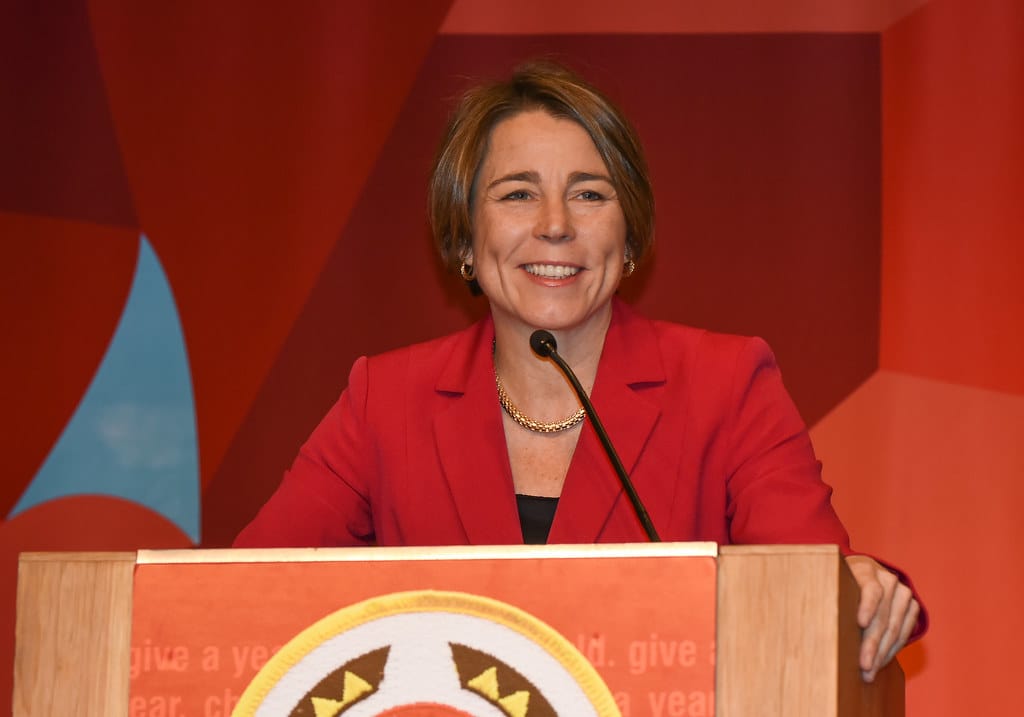Mass. Insider: Maura Healey’s Bid For Governor
Columnist Shane Dillon ’26 begins his new column with a discussion of upcoming Massachusetts general election and the Democratic nominee Maura Healey, who, unusually for a Democratic candidate, may be poised to win.

On Tuesday, Sept. 6, Massachusetts Attorney General Maura Healey became the Democratic nominee for Governor in the state’s primary election, winning with over 85% of the vote. Other primary wins included lieutenant governor nominee Kim Driscoll who is currently the mayor of Salem, Massachusetts, who will appear with Healey on the first ever all-women ticket in Massachusetts history. Attorney General nominee Andrea Campbell may be the first Black woman elected to a statewide office. The auditor and treasurer nominees are also women.
Healey’s only contender, State Sen. Sonia Chang-Diaz, dropped out of the race months before the primary, but her name remained on the ballot because she dropped out too late to have her name removed. Chang-Diaz cited a lack of funding and momentum being a reason for leaving the race. Though she was originally contested, Healey has the energy, popularity, name recognition, and cash on hand to potentially win the governorship. She would become only the second Democratic Governor of Massachusetts since Michael Dukakis left office in 1991, with the first being Deval Patrick (who served as governor from 2007 to 2015). She would also be the first elected female governor of the Commonwealth, as well as the first openly gay governor of any U.S. state (she would share that title with Tina Kotek of Oregon if she wins her own gubernatorial race there this cycle).
While the state is famous for sending progressive firebrands to Congress like Sens. Elizabeth Warren and Ed Markey and Rep. Ayanna Pressley, Massachusetts has a long history of electing Republican governors and lieutenant governors to keep an eye on the heavily Democratic state legislature. Most other statewide offices have been held by Democrats while a Republican held the top job.
Interestingly, many Democrats who have run for governor and lost first served as attorney general in the state. The most recent examples are Martha Coakley in 2014, Tom Riley in 2006, Scott Harshbarger in 1998, and Frank Bellotti in 1990, although other instances date back to 1966.
Many factors could have shifted past election cycles in favor of the Republicans who trampled their attorney general opponents. These past candidates may not have campaigned well. They may have been unpopular at the time, and the political climate of the Commonwealth previously looked more moderate. What makes this race different from earlier campaigns, however, is the national political climate and the differences in fundraising and name recognition between the candidates eyeing the governor’s office this year. With Healey being the first openly gay woman to seek the governorship in a time when the rights of women and LGBTQ+ folks are at risk, representation may truly matter in this race.
Healey’s Republican opponent, Geoff Diehl, lacks both the name recognition and popularity that Healey can boast. Diehl has been endorsed by former President Trump, which will help him with far-right Republican voters in the state, but may harm his chances with more moderate voters. The more moderate Republican who lost to Diehl in the Primary, Chris Doughty, may have had a better chance in the general election. Doughty could have been another Charlie Baker, who, despite being a Republican, is to date one of the most popular governors in the country.
In contrast, Maura Healey is well-positioned. She has minimal opposition within her own party, and she has several other advantages over Diehl. He has lost in a statewide election before; in the 2018 senate election, Diehl lost to Sen. Warren by around 24 pts. It does not look good to be a perennial candidate. Also, while moderate Republicans like Baker, Mitt Romney, and Bill Weld have succeeded in attracting independents and on-the-line Democrats in past elections, Diehl is far from moderate; Healey has the advantage of arguing that he is too much like Trump and alienates everyone who disagrees with him. At 51 years old, Healey is a spring chicken in political years. She has been all across the Commonwealth — playing basketball with our future leaders, participating in call time with grassroots donors, responding to letters from inspired youth, and not being afraid to discuss the significant issues facing Massachusetts’s future. She champions investments in wind energy, expanding the child tax credit, and making West-East high speed rail connecting Boston to Pittsfield a reality.
By strategically waiting for popular Gov. Baker to opt out, Healey is on her way to becoming the Commonwealth’s next governor. She has a solid chance to break both the attorney general curse that has plagued other gubernatorial aspirations and the decades-long Republican hold on the Governor’s office.
According to polling before the primary, Healey led every candidate by a wide margin (see polling data section), except for the hypothetical matchup between her and Baker where a UMass survey had Baker triumphing. She now leads Diehl by a wide margin in general election polling. She told me in a phone call over the summer that her campaign is centered around grassroots organizing and call-time, the only way to win a campaign at heart and at the ballot box. Seeing that she garnered over 630,000 primary votes to Diehl’s approx. 148,000, she has a strong chance of taking the governor’s seat back as a Democrat.
It is said that the party who holds The White House loses seats during the midterm elections. In a year where the national climate should be on the Republican’s side, the Democratic party stands a real chance of taking back the Massachusetts governor’s seat. The general election is this November — please plan to vote, but if you live in a state where your vote may mean more, stay registered there!
If you have thoughts on this or any of our articles, comment below or send us a letter by using this form or emailing [email protected].




Comments ()